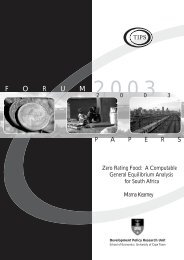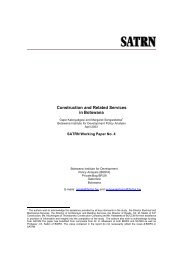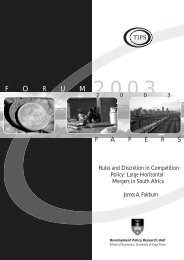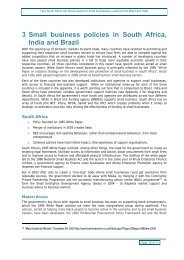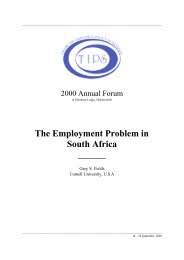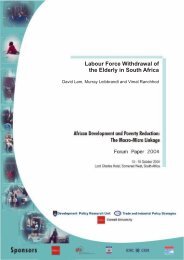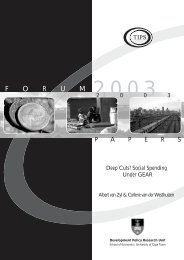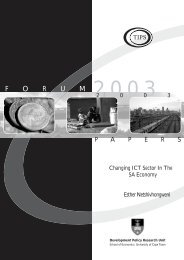Monitor Vol 39 08_Final_Nov08.pdf - tips
Monitor Vol 39 08_Final_Nov08.pdf - tips
Monitor Vol 39 08_Final_Nov08.pdf - tips
Create successful ePaper yourself
Turn your PDF publications into a flip-book with our unique Google optimized e-Paper software.
environmental<br />
policy<br />
69<br />
Climate change and<br />
carbon dioxide (CO 2<br />
)<br />
sequestration:<br />
an African perspective*<br />
By M. Sengul, A.E. Pillay, C.G. Francis<br />
and M. Elkadi †<br />
1. Carbon Dioxide: A Global Threat?<br />
Climate change is at the centre of increasing global concern. Average air and sea temperatures<br />
have increased appreciably during the last century. The international and scientific communities<br />
are in agreement that most of this increase is due to the rising carbon dioxide (CO 2<br />
) concentration<br />
in the Earth’s atmosphere mainly from the burning of coal, oil and natural gas. Amongst possible<br />
solutions for the reduction of excessive greenhouse gases in the atmosphere is the capture and<br />
sequestration of carbon dioxide 1 . This paper focuses on the extent to which some countries in Africa<br />
have contributed to global warming, and explores some of the solutions proposed to sequester<br />
carbon dioxide to alleviate the impact of climate change.<br />
Since 1990 carbon dioxide emissions in Africa have<br />
increased by about 50%. The total carbon dioxide<br />
emissions of the entire African continent are not,<br />
however, anywhere near those of countries such as<br />
India or China. Yet certain African countries have<br />
per capita emissions comparable to some European<br />
countries. What is the outlook for Africa? How should<br />
African countries respond as it becomes increasingly<br />
likely that climate change is occurring? Increased<br />
industrial growth and more foreign investment in<br />
Africa, especially in countries that are politically and<br />
economically stable, have led to huge commercial<br />
developments such as the In Salah gas project in<br />
Algeria, which releases more than a million tons of<br />
carbon dioxide annually; and synthetic fuel plants<br />
and power stations in<br />
Trade & Industry <strong>Monitor</strong><br />
*<br />
This paper was first published in the International Journal of Environmental Studies, 64:5 (October 2007).<br />
†<br />
Author Sengul is from Schlumberger Carbon Services, Abu Dhabi, UAE. Authors Pillay, Francis and Elkadi are from The<br />
Petroleum Institute, Abu Dhabi, UAE<br />
South Africa that generate more than 350 million<br />
tons per year. In this perspective should some<br />
African countries be required to limit greenhouse<br />
gas emissions or should they be immune to<br />
‘environmental taxation’? This paper critically<br />
reviews the carbon dioxide problem in some parts of<br />
Africa and its role in climate change.



